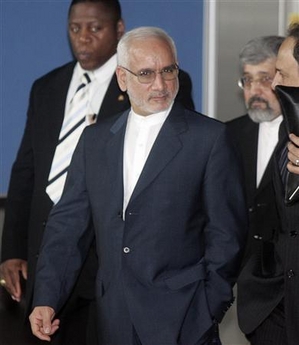The world's nuclear watchdog, which reports to the U.N. Security Council on
Friday, is likely to confirm Iran has flouted demands to stop enriching uranium,
a verdict that could unleash moves to hit Tehran with sanctions.

Iran's nuclear energy
chief Gholamreza Aghazadeh leaves Vienna's U.N. headquarters April 26,
2006. The world's nuclear watchdog , The International Atomic Energy
Agency, which reports to the U.N. Security Council on Friday is likely to
confirm Iran has flouted demands to stop enriching uranium, a verdict that
could unleash moves to hit Tehran with sanctions.
[Reuters] |
International Atomic Energy Agency chief Mohamed ElBaradei was also expected
to say Iran was still stalling IAEA inquiries into its nuclear work, the other
salient issue cited in a 30-day Council deadline for Iranian cooperation that
expires on Friday.
But Iranian defiance has only hardened over the last month, with Tehran
saying it has enriched enough uranium to fuel power plants for the first time
and is researching a machine to enrich even faster, adding that its nuclear
drive was irreversible.
In the two days before the report, Iran has vowed to hit U.S. targets
worldwide if attacked by Washington which has not ruled out war as a last resort
to rein in Tehran.
And Iran's U.N. ambassador said on Thursday Iran will not comply with an
expected security council resolution aimed at curbing its nuclear ambitions
because its programs posed no threat to international peace and security,
"If the Security Council decides to take decisions that are not within its
competence, then Iran does not feel obliged to obey," Iran's U.N. Ambassador
Javad Zarif told reporters.
Diplomats anticipated no big surprises in the report.
"ElBaradei obviously will have to report that far from suspending enrichment,
Iran is steaming ahead," said one Western diplomat accredited to the
Vienna-based IAEA.
Diplomats said questions persisted over Iranian research on state-of-the-art
"P-2" centrifuges, documents found that show how to design an atom bomb core,
and intelligence reports of links between uranium-ore processing,
high-explosives tests and a missile warhead design.
Mark Fitzpatrick, nuclear analyst at the International Institute for
Strategic Studies in London, said world leaders would look for any
substantiation in the report of Iran's claims to rapid progress toward mastering
the enrichment process.
"Answers to such questions will be important in helping the world understand
the degree of urgency of the crisis and scope for diplomacy. If the IAEA cannot
say much about Iran's progress, then policy-makers will rely more on worst-case
scenarios," he told Reuters.
Iran says its nuclear activity aims solely to generate electricity. Western
powers see a smokescreen for an atom bomb project in the Islamic Republic, which
wants Israel destroyed.
Washington, backed by Britain and France, favors limited sanctions if Iran
refuses to shelve enrichment quickly. Russia and China, the Security Council's
other two veto-holding permanent members who want to protect lucrative stakes in
Iran's energy sector, have so far opposed such moves.
"To be credible, the Security Council of course has to act," Secretary of
State Condoleezza Rice said before talks on the issue with NATO foreign
ministers in Bulgaria on Thursday. "It cannot have its word and its will simply
ignored by a (U.N.) member state."
Chinese and U.S. diplomats said the United States was trying to arrange a
meeting on Iran of foreign ministers of the five permanent Council members and
Germany in New York on May 9.
Diplomats said ElBaradei was vexed by Iran's refusal to "pause" enrichment
work even for a limited time to ease tensions, its failure to make good on
promises of better cooperation with probes, and by its growing brinkmanship with
world powers.
But they said he was also unhappy about the Security Council's intervention
and sanctions threats that some IAEA veterans fear could drive Iran out of the
nuclear Non-Proliferation Treaty.
Iran has invoked that specter of late, threatening to freeze relations with
the IAEA and asking what is the point of staying in the NPT without a right to
peaceful enrichment technology.
As heated rhetoric between Iran and the West has escalated, the IAEA has
studiously avoided comment that might be seized on by one or the other side and
has sought preserve technical neutrality key to its basic inspections regime in
Iran.
A diplomat close to ElBaradei said his report would "just lay out the facts,"
not pass judgment on Iranian behavior. "That will be up to the Security
Council," he said.